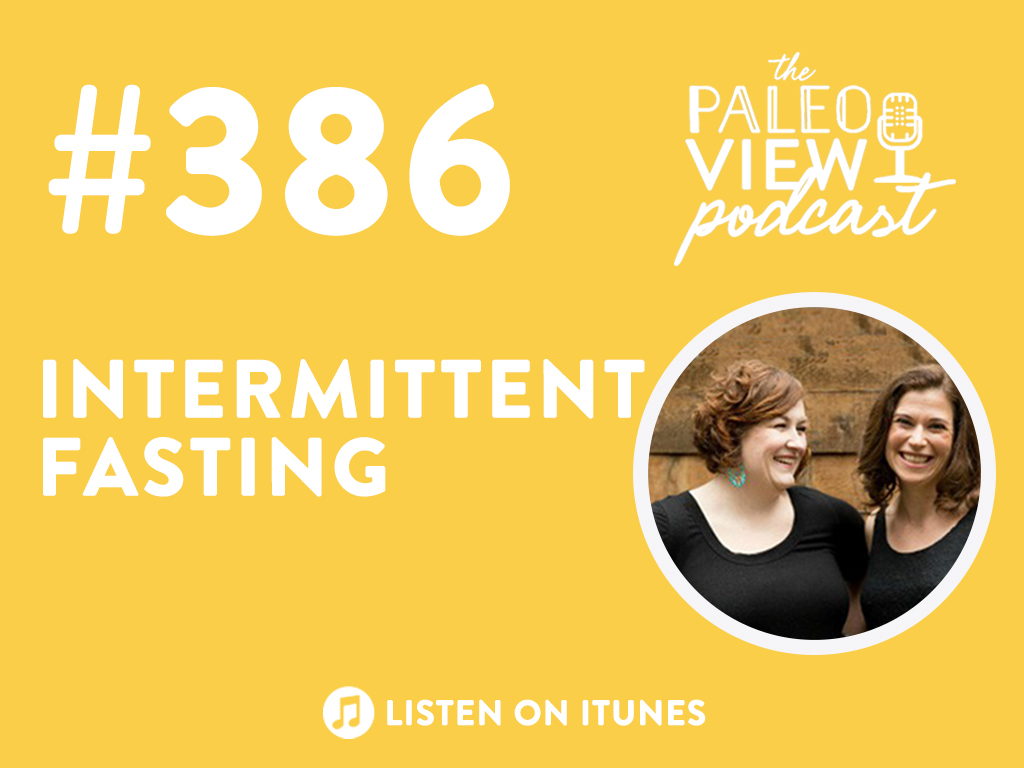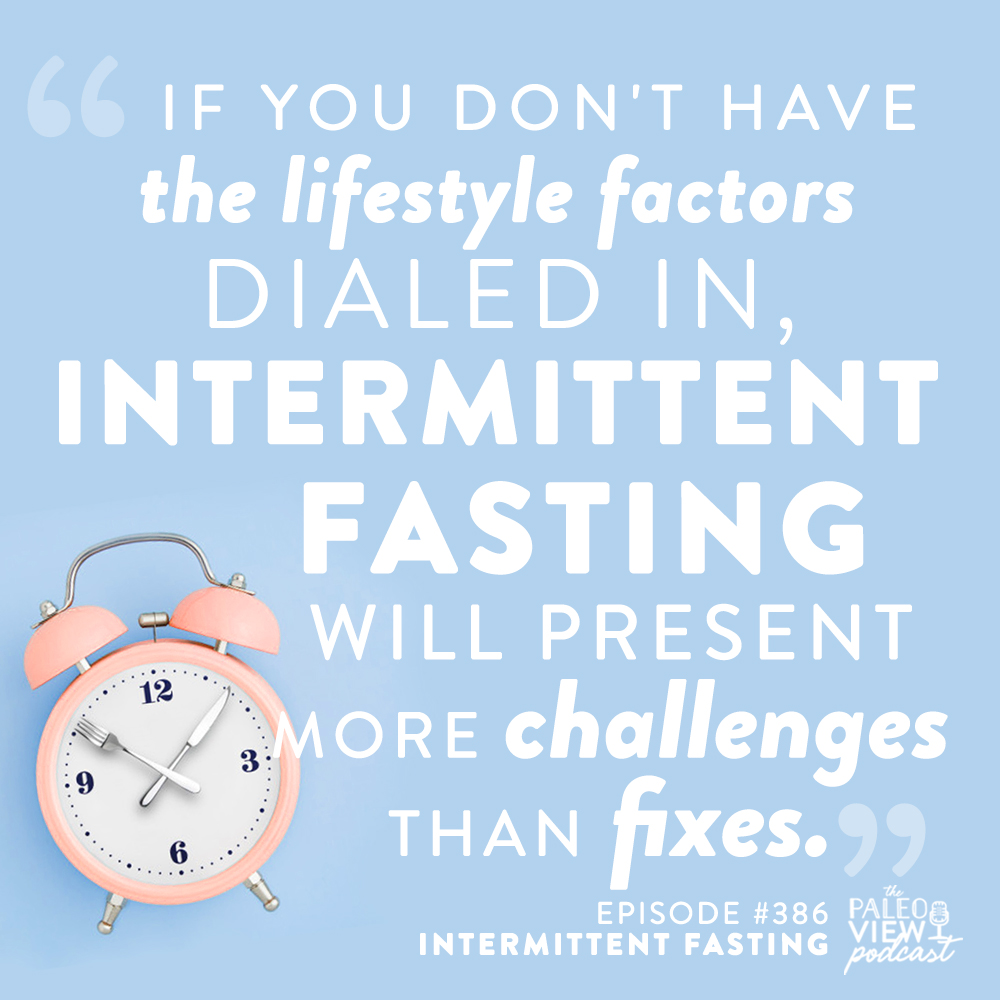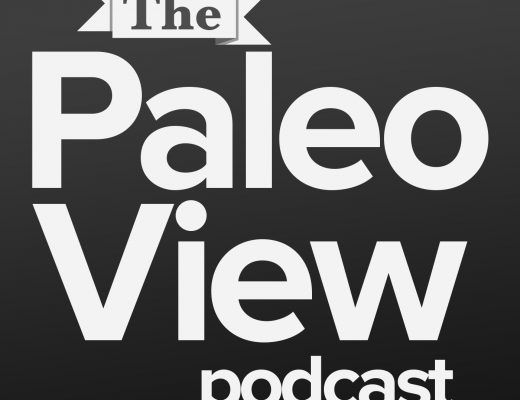
On this week’s show, Stacy and Sarah dive into the latest research on intermittent fasting and cover when this dietary modification is the right choice to experiment with and how to go about that experiment. Enjoy!
If you enjoy the show, please review it on iTunes!
The Paleo View (TPV), Episode 386: Intermittent Fasting
Welcome back to The Paleo View! (0:40)
Stacy is so excited that both she and Sarah were able to take a bit of time off around the holidays.
She hopes it was as restful for Sarah as it was for her!
Yes, Sarah took a real break.
Her family went winter camping and she completely disconnected and fell off the grid.
Sarah feels like she is getting back into a routine, especially now that the kids are back at school.
She is feeling that she has so much more focus after taking a brain-break.
Matt and Stacy are training to be foster parents and will complete that training at the end of January.
They hope to open their home to whoever will need it in the upcoming months, and this is why they are not moving to Florida.
Stacy feels they have a great support system in Virginia, which is why they are opting to stay there.
Matt officially started his first day as a mailman with the United States Postal Service this week.
They have had a lot of change going on in their family, which they were prepared for as 2019 came to a close.
As Stacy covered, this role is the perfect fit for Matt for very many reasons!
Sarah is super excited about all the changes on Stacy’s plate.
On this week’s episode, Stacy and Sarah are going to talk about intermittent fasting (IF).
Stacy does have personal experience with IF, but she comes at it from a very unique perspective.
This is a very hot topic and if this is something that someone is considering, Stacy and Sarah want to help guide them to the latest science. (8:01)
Intermittent Fasting was a very meaty topic for Sarah to dive into, and she even wrote a new blog post about the subject as she was preparing for this show.
There has been so much new research in the last two years that answers a lot of questions that needed to be answered to understand if the hype around IF is warranted.
The Science on Fasting
Sarah first shared the history behind how intermittent fasting came about.
Taking these historical findings, the research used rodent studies took a deeper look at IF in the ’90s and early 2000s.
It was really exciting research with exciting findings!
Rodents on IF either lost body fat or total body weight.
They also have improved insulin sensitivity, reduced fasting glucose and insulin, their blood pressure normalizes, and they have lower levels of inflammation.
Sarah shared how combined with these studies, IF blew up as a dietary resource thanks to how people were sharing about their results on the internet.
There have only been about a dozen well-controlled human studies on the results of IF.
Intermittent fasting can be done in a few different ways, with there being two main ways that are most popular.
You can restrict your feeding window, or fast on alternate days.
The time-restricted feeding window is the most popular and is what is most promoted on the internet.
The initial studies on this showed that on average alternate day fasting naturally reduces your caloric intake.
As reported in the few studies that have looked at this, most people find this to be harder than caloric restriction.
People also tend to lose less weight with IF than with caloric restriction.
However, these days diet culture is all about extremes.
All of the benefits seen as a result of IF can be attributed to the simple fact that these people lost weight. (15:06)
Diving Deeper into the Latest Research
There was a really important study done in 2017 (referenced in the breakfast podcast episode here), where they looked at IF with a time-restricted feeding window.
They looked at people who ate from 8:00 a.m. to 2:00 p.m., versus shifting that window so they were skipping breakfast.
The results were compared with people eating three meals a day in a controlled dietary structure.
There was a very small increase in energy expenditure in both of the fasting groups.
They also showed that there was a slight increase in fat oxidation in the breakfast skipping group.
However, they showed that skipping breakfast came at the cost of increased inflammation.
In addition, a bunch of other studies looking at skipping breakfast as a habit, have shown that this habit increases cholesterol and increases insulin resistance by 54%.
There was a large meta-analysis just published in the last few months that showed that if you regularly skip breakfast you are at a much higher risk of developing type-2 diabetes and cardiovascular disease.
Stacy took a moment to be the voice of, “wait, what?”.
Yes, the human studies show the opposite of the rodent studies.
One of the interesting things that came out of the rodent studies, is that it is really important for the feeding window to be aligned with the circadian rhythms.
One of the things that IF does in rodents is autophagy.
There are many great benefits to autophagy.
However, autophagy is also stimulated by exercise and getting enough sleep.
Keto and intermittent fasting are not the only ways to get autophagy!
It is actually unclear how much autophagy is being stimulated in humans from IF.
Sarah explained mechanistic rodent studies and why she places a lot of value in them.
Intervention studies are a very different thing.
It is much harder to draw a straight line between an intervention study in rodents and an intervention study in humans (23:36).
There have been interesting studies showing a gut microbiome piece to this.
The piece of the circadian rhythm was ignored in science until just two years ago.
Meal Timing
This 2017 paper revealed that these negative effects of breakfast skipping don’t apply to dinner skipping.
Breakfast skipping created higher insulin resistance by the time you actually ate and it was inflammatory.
Dinner skipping didn’t have that negative tradeoff.
There have been two clinical trials done since that one that have looked at this idea of intermittent fasting, but you eat breakfast.
You basically get all your food into a six or eight-hour feeding window, but starting first thing in the morning.
The human studies are actually really interesting when the feeding window is shifted.
They have shown some cardio-metabolic benefits above and beyond any particular change in diet or weight loss.
The people following the earlier feeding window had higher levels of insulin sensitivity and beta-cells in their pancreas were healthier.
They also found that blood pressure was reduced, oxidative stress was reduced, and leptin and ghrelin were lower.
The authors of this study drew the conclusion that the benefits of this early time-restricted feeding are being driven by appetite regulation.
Lifestyle Factors
However, Sarah feels that there is not enough data to be super conclusive on this just yet.
Sarah also shared the data on why intermittent fasting is not appropriate for people with unmanaged chronic stress.
There are now these three recent studies that were very well controlled and designed, that show that IF with an early feeding window may have some benefits above and beyond a healthy diet.
This does support what we saw in rodents.
However, Sarah thinks it is really important to emphasize the magnitude of the effect.
This is what puts the effort that goes into IF in context with all the other healthy choices we know to make.
We get very fixated on dietary strategies for insulin regulation, and actually our insulin if more sensitive to lifestyle than it is to diet. (34:11)
There are studies that show that when you do not get enough sleep on weeknights, insulin sensitivity decreases between 15 and 30%.
Even just one night of decreased sleep causes a 25% decrease in insulin sensitivity.
Five weeks of this early time-restricted feeding IF had half of the effect of just getting enough sleep.
When is IF the Right Tool For You
It is important to understand the magnitude of the effect given the amount of effort IF is for most people.
Sarah would argue that IF is only something to play with once you have done the work with sleep quality and quantity, living an active lifestyle and managing stress.
Stacy shared her experience from when she has seen IF used correctly.
If you are in-tune with your body, it makes sense to play with your meal timing.
Stacy suggests to anyone who is thinking about this to prioritize documenting how you feel and how your digestion is doing.
Don’t get too detailed or overwhelmed if you have a history of disordered eating.
It is easy to test your blood glucose now, so if the lifestyle factors are dialed in and you are ready to experiment with IF, the resources to see if it is a good fit are available.
If you don’t have the other things dialed in, IF will present more challenges than fixes.
From the science, Sarah 100% agrees.
Sarah has an online course called the healthy weight loss course where she goes through the research on how to lose and maintain weight loss.
The course teaches you both how to sustain weight loss and then maintain it on the other side.
The goal is to get healthier while losing weight.
There are two main reasons why people gravitate towards intermittent fasting.
The performance piece, which there is not very much science looking at that.
The little bit that has been done shows that there is some anabolic effects of intermittent fasting in athletes.
The studies covered in this episode evaluate the effect on metabolism, insulin, and cardiovascular disease risk factors.
These studies are also specifically looking at the role that IF plays on weight loss.
If you are someone considering intermittent fasting as a weight-loss strategy in 2020 or are someone who has fallen into the yo-yo diet cycle, Sarah thinks that her healthy weight loss course will be very helpful for you.
Stacy says to just get some sleep and take a probiotic!
Don’t forget red light therapy also plays a role in autophagy.
Sarah stressed again that getting enough sleep and moving your body will stimulate autophagy.
You don’t need to do these extreme weirdo diets to get the benefits of autophagy.
Closing
Stacy thanked Sarah for all of the science on this topic. (47:59)
What benefits one person is going to be different for you.
Think about what it is you are trying to achieve and make sure that you are listening to your body very intentionally as you are trying to improve that.
While most aspects look different for everybody, the science is pretty conclusive on a couple of things.
Stacy was recently joking with Matt that the Paleo View’s name should be Just Eat Some Vegetables.
Sarah and Stacy talk a lot about the things that are good for you on this show.
You can get great results towards your goals when you focus on sleep, activity, and all the things that Stacy and Sarah recommend.
Hopefully, this episode was helpful, and Stacy and Sarah wish everyone who is embarking to change their habits success.
Taking small steps towards health in sustainable, long-term, achievable ways is the way to help yourself.
Jumping in and doing fifty things all at once is the way to set yourself up for failure, which isn’t what they want for you.
Stacy and Sarah want you to be healthy and happy longterm.
Thank you, Sarah, for helping to do the research so people could make informed decisions on living their best life.
Thank you for listening, Stacy and Sarah will be back next week! (50:05)





